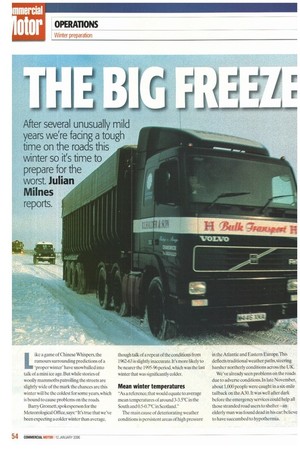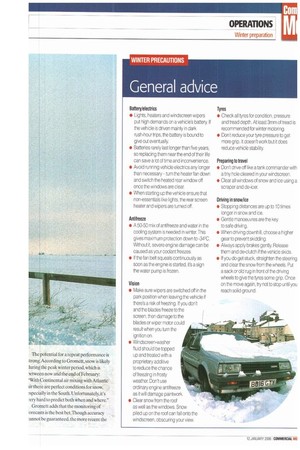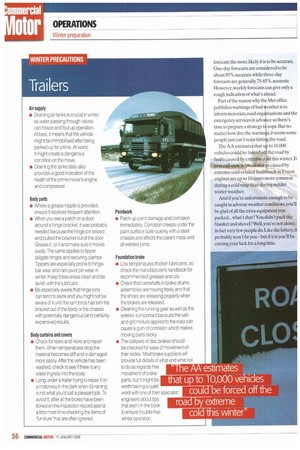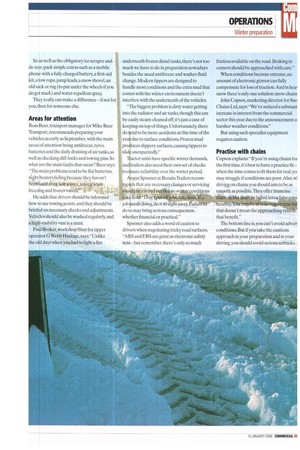L ike a game of Chinese Whispers. the rumours surrounding predictions
Page 54

Page 55

Page 56

Page 57

If you've noticed an error in this article please click here to report it so we can fix it.
of a 'proper winter' have snowballed into talk of a mini ice age. But while stories of woolly mammoths patrolling the streets are slightly wide of the mark the chances are this winter will be the coldest for some years, which is bound to cause problems on the roads.
Barry Gromett, spokesperson for the Meteorological Office,says:"It's true that we've been expecting a colder winter than average, though talk of a repeat of the conditions from 1962-63 is slightly inaccurate. It's more likely to be nearer the 1995-96 period, which was the last winter that was significantly colder.
Mean winter temperatures
-As a reference, that would equate to average mean temperatures of around 3-3.5°C in the South and 0.5-0.7°C in Scotland."
The main cause of deteriorating weather conditions is persistent areas of high pressure in the Atlantic and Eastern Europe.This deflects traditional weather paths, steering harsher northerly conditions across the UK.
We've already seen problems on the roads due to adverse conditions. In late November, about 1,000 people were caught in a six-mile tailback on the A30.It was well after dark before the emergency services could help all those stranded road users to shelter —an elderly man was found dead in his car; believe to have succumbed to hypothermia. The 13otentia1 for a repeat performance is ;trongt1 According to Gromett, snow is likely luring the peak winter period, which is )etwe n now and the end of February: 'Withco ntinental air mixing with Atlantic t iir there are perfect conditions for snow, :specially in the South. Unfortunately, it's very hard to predict both when and where.'
Gromett adds that the monitoring of arecasts is the best bet.Though accuracy :annot be guaranteed, the more recent the forecast, the more likely it is to be accurate. One-day forecasts are considered to be about 85% accurate while three-day forecasts are generally 75-85% accurate. However, weekly forecasts can give only a rough indication of what's ahead.
Part of the reason why the Met office publishes warnings of bad weather is to inform motorists, road organisations and the emergency services in advance so there's time to prepare a strategy to cope. But no matter how dire the warnings, it seems some people just can't resist hitting the road.
The AA estimates that up to 10,000 vehicles could be forced off the road by faults caused by extreme cold this winter. It 11110irys call-outs to breakdowns caused by extreme cold-related faults such as frozen engines are up to 10 times more common' during a cold snap than during milder winter weather, And if you're unfortunate enough lobe caught in adverse weather conditions, you'll be glad of all the extra equipment you packed... what's that? You didn't pack the blanket and shovel? Well, you're not alone; in fact very few people do. Like the lottery, it probably won't be you — but if it is you'll be cursing your luck for a long time. So as well as the obligatory ice scraper and de-icer. pack simple extras such as a mobile phone with a fully charged battery, a first-aid kit, a tow rope. jump leads, a snow shovel, an old sack or rug (to put under the wheels if you do get stuck) and water-repellent spray.
They really can make a difference if not for you, then for someone else.
Areas for attention
Ross Beer, transport manager for Mike Beer Transport, recommends preparing your vehicles as early as September, with the main areas of attention being antifreeze, tyres, batteries and the daily draining of air tanks, as well as checking diff-locks and towing pins. So what are the main faults that occur? Beer says: The main problems tend to be flat batteries, night heaters failing because they haven't been Used since last winter, screen wash freezing and Frozen valves."
He adds that drivers should be informed how to use towing points, and they should be briefed on necessary checks and adjustments. Vehicles should also be washed regularly, and a high-visibility vest is a must.
Paul Broker, workshop fitter for tipper operator GWebb Haulage, says: "Unlike the old days when you had to light a fire underneath frozen diesel tanks,there's not too much we have to do in preparation nowadays besides the usual antifreeze and washer-fluid change. Modern tippers are designed to handle most conditions and the extra mud that comes with the winter environment doesn't interfere with the underneath of the vehicles, "The biggest problem is dirty water getting into the radiator and air tanks, though this can be easily steam-cleaned off; it's just a case of keeping on top of things. Unfortunately, there do tend lobe more accidents at this time of the year due to surface conditions. Frozen mud produces slippery surfaces, causing tippers to slide unexpectedly."
Tractor units have specific winter demands, and trailers also need their own set of checks to ensure reliability over the winter period. Angus Spooner at Benalu Trailers recomends that any necessary changes or servicing tit hould be carried out . , re winter CO/Ill ii iSIIIS e hold:"Don't put jobs until later. If a job needs doing, dolt straight away. Failure lure to do so may bring serious consequences, whether financial or practical."
Spooner also adds a word of caution to drivers when negotiating tricky road surfaces. "ABS and EBS are great as electronic safety nets but remember, there's only so much friction available on the road. Braking in corners should be approached with care."
When conditions become extreme, no amount of electronic gizmos can fully compensate for loss of traction. And in heal snow there's only one solution:snow chains John Copson, marketing director for Sno Chains Ltd, says:"We 've noticed a substant increase in interest from the commercial sector this year due to the announcement o harsher weather conditions" But using such specialist equipment requires caution.
Practise with chains
Copson explains-If you're using chains for the first time, it's best to have a practice fit when the time comes to fit them for real, yo may struggle if conditions are poor.Also,w1 driving on chains you should aim to be as sin ooth as possible. They offer immense action, but don't be lulled into, e s tecurity. You may he able toiI that doesn't mean the approaching ve . that benefit."
The bottom line is, you can't avoid advers. conditions. But if you take the cautious approach in your preparation and in your driving, you should avoid serious setbacks.
























































































































































































